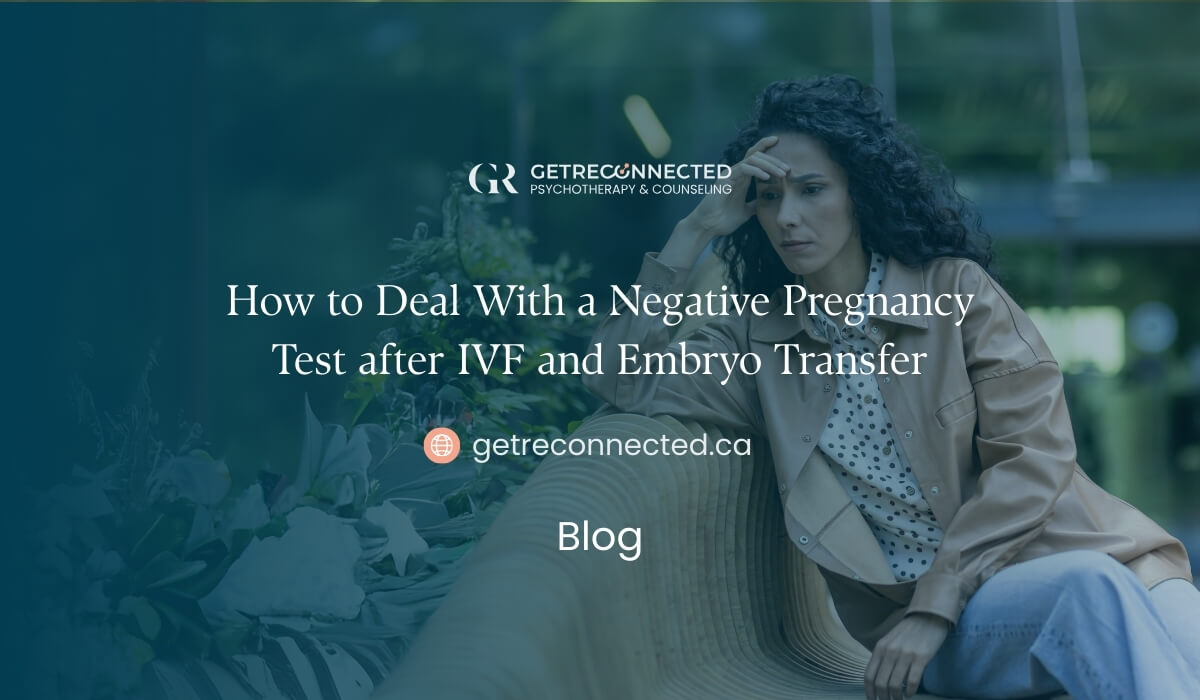Fertility With Delia - Reproductive Trauma Therapist
Delia Petrescu, MA, RP
I’m Delia, a Reproductive Trauma Therapist who understands that your path to parenthood isn’t just medical, it’s emotional and relational. It’s exhausting! I can be there to support you in this journey.
As Seen On
(In)Fertility Counselling in Toronto
Sometimes the path to parenthood isn’t a straight line – and you shouldn’t have to walk it alone.
Most of us grew up believing that when we were ready, building a family would simply happen.
But for 1 in 6 couples, the journey is filled with waiting, uncertainty, and invisible losses.
Infertility isn’t just a medical issue. It’s a disruption to the order of things … at least, the order you expected.
It challenges your identity, your relationships, your hopes – and it can leave you feeling stuck while everyone else seems to move forward.
About Me
When starting a family feels like an uphill battle, I’m here to climb alongside you.
If fertility has thrown you curveballs, you’re definitely not facing this alone. All that waiting, not knowing what’s next, the heartbreak — it’s exhausting, and that’s exactly why I do this work.
I use something called Accelerated Resolution Therapy (ART) in my practice. It might sound fancy, but it’s really just a way to help your mind work through tough memories using visualization and eye movements. It’s particularly helpful for dealing with the anxiety and grief that can pile up during fertility struggles.



I can help address the following
Infertility & Assisted Reproductive Treatments
You Are Not Alone
1 in 6
1 in 4
80%


Membership and Associations

College of Registered Psychotherapists of Ontario (CRPO)

Fertility Matters Canada - Professional Member

American Society for Reproductive Medicine - Mental Health Professional Grop

Ontario Society of Registered Psychotherapists (OSRP)

Canadian Fertility & Andrology Society - Professional Member

International Society of Accelerated Resolution Therapy - Professional Member

Blogs

Healing After Loss: Trauma Therapy, Grief, and Infertility Support with Delia Petrescu | Fertility Village Podcast
Delia was recently a guest on Fertility Village Live, a weekly show dedicated to honest conversations about infertility, loss, and healing. In this episode, she

Pregnancy Loss: Living with the Children Who Never Were
The Psychological Reality of Pregnancy Loss There’s a particular kind of grief that doesn’t really fit into our cultural narratives about loss. It’s the grief

How to Deal With a Negative Pregnancy Test after IVF and Embryo Transfer
There’s a particular kind of heartbreak that comes with seeing a negative pregnancy test result following an embryo transfer. It’s different from the disappointment of
FAQs
What is infertility, and when should I seek help?
Infertility means you’ve been trying to get pregnant without success—typically a year if you’re under 35, or six months if you’re over 35. But don’t wait if something feels off, like irregular periods or previous miscarriages. Trust your gut. And if trying to conceive is causing major stress or taking over your life, that’s when counselling can help, regardless of how long you’ve been trying.
Is infertility only a female issue?
Absolutely not. About one-third of fertility issues are related to the female, one-third to the male, and one-third are either a combination of both or unexplained.
Men can have issues with sperm count or quality —and things like stress, lifestyle, and medical conditions affect male fertility too. It’s really a couple’s journey, not just something women deal with.
That’s why it’s important for both partners to get checked out and support each other through the process.
How can counselling help with infertility?
Counseling gives you a safe space to process all the emotions that come with fertility struggles—the frustration, grief, anxiety, and relationship stress. It’s incredibly isolating, and having someone who gets it can make a huge difference. I help you develop coping strategies for the ups and downs, work through any trauma from losses or difficult procedures, and navigate tough decisions about treatment options. Plus, couples counselling can strengthen your relationship when this journey puts strain on your partnership. Think of it as emotional support and practical tools to help you feel more in control during a time when so much feels out of your hands.
I’ve had a miscarriage — is it normal to still feel affected by it?
Absolutely. Miscarriage is a real loss, and grief doesn’t follow a timeline. Whether it happened weeks ago or years ago, it’s completely normal to still feel sad, anxious, or triggered by certain things.
Many people expect to “get over it” quickly, but that’s not how grief works. You might feel fine one day and devastated the next—that’s normal too.
If it’s affecting your daily life, relationships, or ability to move forward, counselling can help you process that loss and find ways to honour your experience while still opening your heart to hope again.
Do you work with LGBTQIA+ individuals and couples?
Absolutely. I work with all kinds of families and understand that the path to parenthood looks different for everyone—whether you’re using donors, surrogacy, adoption, or other options.
The emotional challenges around building a family are universal, even if the journey isn’t. I’m here to support you through whatever route feels right for you, without judgment and with full respect for your family’s unique story.
What if I feel like everyone around me is moving on — except me?
That feeling is so incredibly common and painful. It can feel like the whole world is pregnant or announcing babies while you’re stuck in this endless waiting.
Social media makes it worse—everyone’s highlight reel can make your struggles feel even more isolating. It’s normal to feel jealous, left behind, or like something’s wrong with you when it seems effortless for others.
Those feelings don’t make you a bad person. They make you human. Counselling can help you work through that grief and find ways to reconnect with joy and hope, even when your timeline looks different from everyone else’s.





